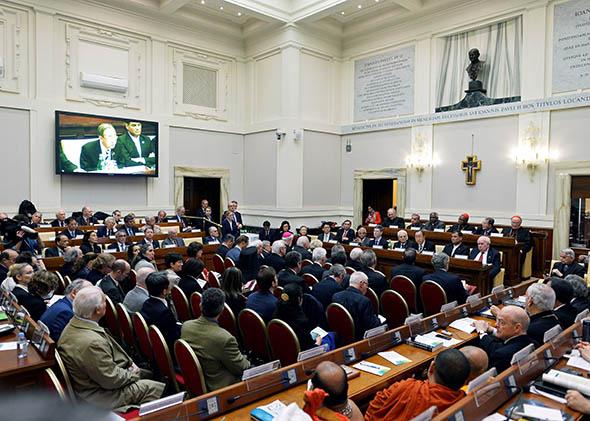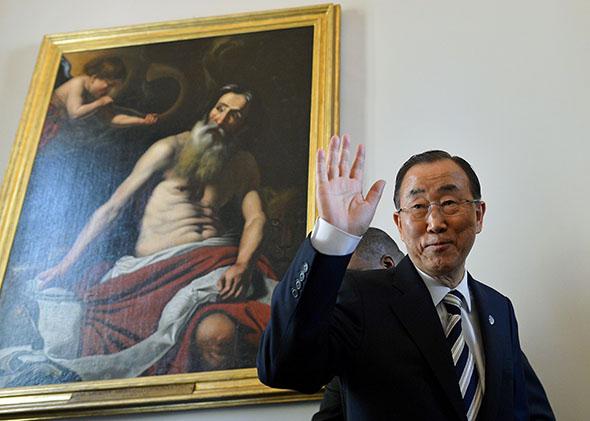This week, while at Vatican City in Rome to manage press for the first-ever meeting on climate change between Pope Francis and United Nations Secretary-General Ban Ki-moon, my faith in a force more powerful was renewed. I am not religious, despite being descended from a long line of Amish and Mennonite preachers. But at the climate confab, I became a believer again. And I wasn’t alone.
It wasn’t my faith in God that was renewed at the Vatican but rather a faith in our ability to get something done on climate change. And as an American, whose Congress isn’t even close to acting aggressively or quickly enough on climate change, that’s saying something. Even the Pope’s and the U.N.’s top policy officials were clearly inspired by the event, which was hosted by the Vatican’s Pontifical Academy of Sciences. Throughout the day I witnessed multiple about-faces of previously cynical staff rapidly turning toward optimism.
This Vatican moment was a game-changer. Science and religion were forcefully and unwaveringly aligning. Tuesday’s high-level session brought together multiple presidents, CEOs, academics, scientists, and all the major religions, and ended with this final, forceful statement. The event was a prelude to the Pope’s summer encyclical on climate change, and it laid a solid foundation.
But more importantly—and this is why it instilled faith in many of us—the meeting featured some of the strongest words yet from the Vatican’s Cardinal Peter Turkson, the Pope’s right-hand policy man and the drafter of the first round of what will eventually be the Pope’s climate encyclical, and from the U.N.’s Ban Ki-moon.
Beyond the expected shout-outs to the upcoming climate talks in Paris later this year and to the need for a strong Green Climate Fund, which will assist developing countries in climate adaptation, the U.N.’s Ban noted in no uncertain terms how “morally indefensible” it would be to allow a temperature rise of 4 to 5 degrees Celsius, calling on everyone to reduce their individual carbon footprint and thoughtless consumption. His pitch was more pointed than I had heard before. One of the leading rabbis, Rabbi David Rosen, took it one step further, calling out meat-intensive diets as completely unsustainable given their massive contribution to greenhouse gas emissions.
The Vatican’s Turkson, meanwhile, pulled out all the stops, saying that “a crime against the natural world is a sin,” and “to cause species to become extinct and to destroy the biological diversity of God’s creation … are sins.” Turkson warned about how quickly we are degrading the planet’s integrity, stripping its forests, destroying its wetlands, and contaminating its waters, land, and air.
These declarations were not soft, feel-good, and vague speeches by politicos keen to be perceived as leading on the most urgent issue facing humanity. These were unequivocal, unwavering statements: “Decision mitigation is a moral and religious imperative for humanity” and the “summit in Paris may be the last effective opportunity” to keep the planet safe.

Photo by Alberto Pizzoli/AFP/Getty Images
The leaders of the conference were undeterred by the hecklers who crept onto the Vatican campus. Marc Morano, for example, who is associated with the climate-skeptical Heartland Institute, snuck into the Vatican and attempted, to no avail, to disrupt the press briefing with the U.N. secretary-general while Ban was reporting on his meeting with the Pope. Morano’s account of what happened, that he was maliciously shut down after offering a benign question, misrepresents reality. Standing beside him, I can attest to what was instead a hijacking of protocol and the microphone. He said a few words about “global warming skeptics coming to talk” but coming to disrupt would be more accurate. He interrupted the secretary-general and the moderator, and was later escorted from the premises by Vatican officials.
What’s troubling about moments like this is that they work. The U.S. media reporting from the Vatican meeting felt compelled to give Morano critical space in their stories. It’s not just that he was an unexpected and therefore newsworthy interruption—giving his “side” is part of American broadcast media’s history of false balance even when there are not two legitimate sides of a story to balance. To be clear, the verdict is not still out on climate change. There’s overwhelming consensus when it comes to the science behind global warming, yet some media outlets (fewer all the time, fortunately) continue to give voice to the small percent that disagrees. Standing beside Morano, surrounded by representatives of the most powerful institutions in the world, it was quite clear to me that the Heartland Institute, though well funded by the Koch brothers, is ineffectually extreme and ultimately a minority player in society’s overall push toward climate progress.
In many ways, the Heartland emissaries proved, through their apoplectic protest, how peripheral they were to the whole process. There was no need for anyone to fight them in that moment; the majority opinion, the moral call to act on climate, was already winning the day. The global response to our conversation at the Vatican has been unequivocally positive, with every major outlet in the Western world covering the talks favorably.
As we left Vatican City this week—which is carbon-neutral thanks to solar power—there was a palpable sense that history was made within the walls of Casina Pio IV where our deliberations took place. This was no typical conference. This was a Sermon on the Mount moment, wherein the beatitudes of a new era were laid down. And we left as disciples, renewed in our faith that we must and will act in time to save humanity from itself—an agenda that would be a worthy legacy of the Pope’s Jesus.
